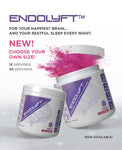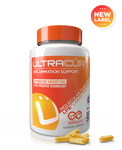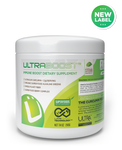Aging and chronic inflammation are so closely tied that scientists have dubbed it inflammaging.
Inflammaging is the chronic, low-grade inflammation commonly seen as we age.
It contributes to several “lifestyle” and metabolic diseases, and is in fact tied to most of the diseases we associate with older folks.
If we can stop this inflammation in its tracks, we could potentially slow aging, reverse or prevent diseases, and extend a healthy lifespan.

This Bully Is the Bad Guy
Studies reveal a key factor in the aging process – a gene-regulating protein complex called Nuclear Factor kappa Beta (NF-kB).
NF-kB is a major driver of chronic inflammation. Inhibiting NF-kB can lower inflammation.
Acute inflammation is available for a reason. It can save your life.
However, when inflammation is sustained over long periods of time, it can take your life.
Scientists now know that certain botanicals can slow inflammaging. Those that inhibit cellular NF-kB play a key role.
The discovery that we can inhibit NF-kB lets us at least partially control how we age in a very practical way.
NF-kB: Gas Pedal for Inflammation
Nuclear factor kappa B (NF-kB) triggers inflammation in cells and tissues.
The “nuclear” here is the nucleus of the cell. That’s where chromosomes carry genetic information that influences NF-kB expression.
When NF-kB moves into the nucleus of the cell, it triggers pro-inflammatory cytokines.
These cytokines are carried by your circulatory system throughout the entire body. They trigger a cascade of inflammatory changes.
Chronic inflammation destroys cells, which fuels even more NF-kB inflammation.
Effects include DNA damage, tissue loss, and other hazards linked to aging.
Signs of Inflammation Everywhere
For example, elevated blood glucose and insulin damage the blood vessels, which creates a cascade of inflammation. Then we get plaque buildup, atherosclerosis...
Alzheimer’s is also called diabetes type 3.
Most “modern” diseases have inflammation as their hallmark.
Our podcast guest this week, former pharmacist turned holistic health coach Keith Bishop, treats cancer, Alzheimer’s, and diabetes basically the same. In all of them, he works to inhibit NF-kB signaling.
NF-kB activation promotes inflammaging, whereas blocking NF-kB slows inflammaging.
Fortunately, you can inhibit NF-kB signaling with select supplements... botanicals that bind to NF-kB to balance inflammation.

Curcumin: The Granddaddy of NF-kB Inhibitors
Curcumin, derived from the turmeric plant, is one of the most well-known NF-kB inhibitors.
Go to PubMed and search “curcumin – NF-kB” and you get 1,137 results. To say it’s been well-studied as an NF-kB inhibitor is a supreme understatement. Most of these studies were done in the past five to ten years.
Obviously, we can just touch on a few high points here, or you’ll be reading all day. 🙄
Curcumin for Metabolic Support
In metabolic diseases such as obesity, diabetes, and metabolic syndrome, fatty tissues pump out inflammatory cytokines.
Animal studies show that curcumin protects the liver from fat deposits and so prevents progression of fatty liver disease to cirrhosis and liver cancer.[1]
Animals fed a high-fructose diet (a sure way to induce metabolic dysfunction), curcumin reversed insulin resistance. In addition, it lowered blood sugar, cholesterol, triglycerides, and many other inflammatory markers.[2]
Curcumin Protects Your Brain Cells from Plaque
The link from inflammation to Alzheimer’s is undeniable. Neurons are very susceptible to inflammatory damage.
Many of the studies about curcumin and Alzheimer’s have been done using mice so we don’t yet know the full results in humans. However, the animal results have been impressive.
One study found that curcumin protected brain cells from damaging inflammation, shrank the size of accumulated plaques by over 30%, and lowered beta-amyloid levels.[3]
Curcumin binds to amyloid beta plaque to limit plaque growth. It also blocks formation of new plaques and was also shown to reduce oxidative damage.
Curcumin Supports Optimal Cell Signaling by Reducing NF-kB
Extensive research over the past 20 years shows that curcuminoids, the active ingredient in turmeric, interfere with many cell signaling pathways. This supports a potential role for curcumin in modulating cancer development and progression.[4]
Various studies suggest that NF-kB inhibition could be helpful for cancers.[5,6,7,8]
One laboratory study showed that curcumin’s NF-kB blockade directly led to the elimination of cancer stem cells.[9]
This is important because stem cells have survival traits that often let them survive chemotherapy, only to emerge following treatment. Ousting them is critical for long-term remission.

Buddies, Not Bullies
It’s safe to assume that nearly everyone needs more inflammation balance, given the standard American diet, foods grown in poor soil, a sedentary lifestyle, and inadequate sleep habits.
Scientists have shown that curcumin is your friend and buddy... a way to balance inflammation so you can live a spunkier lifestyle.
What’s your take on that research?
Research:
1. Afrin R, Arumugam S, Rahman A, et al. Curcumin ameliorates liver damage and progression of NASH in NASH-HCC mouse model possibly by modulating HMGB1-NF-kappaB translocation. Int Immunopharmacol. 2017 Mar;44:174-82.
2. Kelany ME, Hakami TM, Omar AH. Curcumin improves the metabolic syndrome in high-fructose-diet-fed rats: role of TNF-alpha, NF-kappaB, and oxidative stress. Can J Physiol Pharmacol. 2017 Feb;95(2):140-50.
3. Zhang C, Browne A, Child D, Tanzi RE. Curcumin decreases amyloid-beta peptide levels by attenuating the maturation of amyloid-beta precursor protein.J Biol Chem. 2010;285(37):28472-80.
4. https://www.cancer.gov/about-cancer/treatment/cam/hp/curcumin-pdq
5. Dhillon N, Aggarwal BB, Newman RA, et al. Phase II trial of curcumin in patients with advanced pancreatic cancer. Clin Cancer Res. 2008 Jul 15;14(14):4491-9.
6. Everett PC, Meyers JA, Makkinje A, et al. Preclinical assessment of curcumin as a potential therapy for B-CLL. Am J Hematol. 2007 Jan;82(1):23-30.
7. Kuriakose MA, Ramdas K, Dey B, et al. A Randomized Double-Blind Placebo-Controlled Phase IIB Trial of Curcumin in Oral Leukoplakia. Cancer Prev Res (Phila). 2016 Aug;9(8):683-91.
8. Marquardt JU, Gomez-Quiroz L, Arreguin Camacho LO, et al. Curcumin effectively inhibits oncogenic NF-kappaB signaling and restrains stemness features in liver cancer. J Hepatol. 2015 Sep;63(3):661-9.
9. Marquardt JU, Gomez-Quiroz L, Arreguin Camacho LO, et al. Curcumin effectively inhibits oncogenic NF-kappaB signaling and restrains stemness features in liver cancer. J Hepatol. 2015 Sep;63(3):661-9.

Learn more on this week's podcast...
In this week's podcast we continued our fascinating discussion with former pharmacist turned natural health coach, Keith Bishop.
He talked about how to lower NF-kB so you can lower inflammation, sidestep chronic diseases, and enjoy living your life.
If you prefer the audio only version, it's here.




